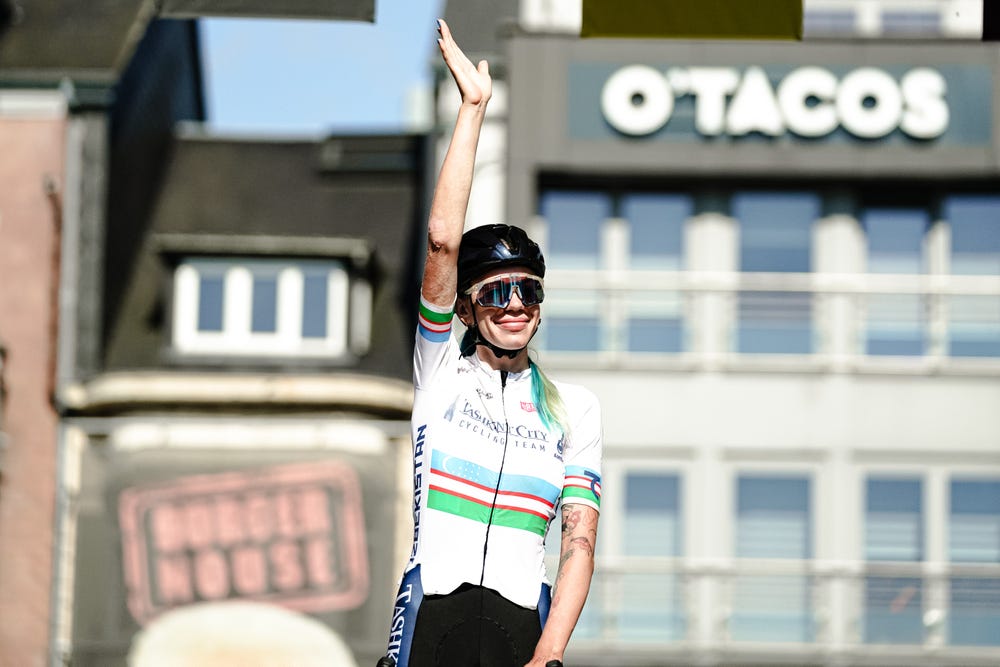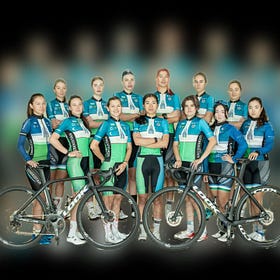Tour de France Femmes: Tashkent's last rider finishes race on Alpe d'Huez
'Uzbekistan cycles too' - Yanina Kuskova finished the race 47th overall
The final stage of the 2024 Tour de France Femmes has to be recorded in the historical annuls of professional cycling as one of the most exciting ever. The battle between Demi Vollering and Kasia Niewiadoma, as the reigning champion fought to rip the yellow jersey away on the hairpins of Alpe d’Huez, was sensational.
Further down the mythical mount another battle was taking place. It was one against the norm, against the status quo of professional cycling. Tashkent City Women PCT had been cast as the odd-balls at this Tour de France Femmes. Many commentators questioned their legitimacy and worthiness to be at the race.
Backing up those claims was the fact that four of their riders had to pull out during the first stage. Two more followed in the first half of the race, leaving just one left - 22 year old Yanina Kuskova.
"I'm confident I can finish the Tour de France," Kuskova told Cycling Weekly last week. "I would like to show to everyone that riders from the Uzbekistan team can finish this strong race and show in the world that Uzbekistan cycles too."
Tashkent on Tour - The Uzbek team at the Tour de France Femmes 2024
Throughout the first half of the 1990s, one man from Uzbekistan ruled the sprints at the men’s Tour de France. Known as the Tashkent Terror, Djamolidine Abdoujaparov won three green jerseys, nine Tour de France stages and seven more at the Vuelta.
Well Kuskova did finish the Tour de France. In fact, she did so strongly, coming 45th on the Alpe d’Huez stage and 47th overall.
The four-time and reigning Uzbekistan national champion has been the stand-out rider for this team over the past two seasons. She has scored several top results in Europe, including wining the Porec Trophy last season. She’s a tall, rangy climber, and in my opinion her ceiling is high.
"I try to follow the strong riders inside the peloton and try to get a good position in the front but it's not easy,” she said, declaring that she had ambitions at this race not only to finish, but to follow the favourites where possible.
Kuskova told the story of her race in a social media post on Sunday evening:
The big race is over. When I found out this winter that our team would be allowed to compete in pro-tour races at first I couldn’t believe it, but then I was happy.
We had done very few races at that level this year.
And when we came to the Tour de France, at first everything was good, but already in the first stage we started to have problems, we lost half of the team and many people criticized it very much, saying that we should not participate in such races.
It was very painful for me to hear that. Tears filled my eyes the whole time. And then the rest of the girls on my team came off. And I felt bad, I felt like everyone was watching and laughing. It was hard to get to the start.
I don’t speak English, only Russian, and I was alone in the peloton, and I was sad.
But then a lot of people supported me, including my whole team who believed in me. And I had no choice but to go all the way, no matter what it cost me.
I want to say a huge thank you to everyone who supported me in a difficult moment. Your support was very important.
I finished the race and this is already a small victory for me.
Yes, I finished in 47th place, but I had a great experience and I’m glad I did it.
Once again, thank you all very much.
I have been following this team for a while now, and if you have been a long-time reader of Global Peloton, so have you.
Honestly, it saddened me in the last week seeing the criticism aimed towards these women. They have come an awful long way to get to the Tour de France, they are passionate about the sport and are working hard to improve themselves.
Tashkent also arrived at the Tour on sporting merit as qualified by the UCI, not due to some bribe as some online individuals jumped to. If you didn’t think they should be racing, then your issue should be with the UCI, not Tashkent. You cannot blame a cycling team for taking up a once-in-a-lifetime opportunity to race in the Tour de France.
And it will most likely be once-in-a-lifetime. Tashkent have been nowhere near as prolific this season due to their WorldTour commitments. We will not see them at the Tour de France Femmes next year.
The team’s DS Volodymyr Starchyk gave a passionate plea against the vitriol when he spoke to Velo.
“If a critic wants to slam us, the first thing they need to do is look in the mirror. If they’re a saint and there’s a halo above their head, fair enough, I’ll go along with the critiques.”
“So don’t destroy them, don’t kill these girls, but try to write something that when they read it, they have the desire to carry on cycling. And they’ll go back home to Uzbekistan and tell the other women there ‘look, there’s the Tour, it’s hard to do but we did our utmost.”
“Change the rules and we won’t come here. Then the government [who sponsor the team] accepted this thing – for them in Uzbekistan, the Olympic Games are bigger than the Tour. But I see it differently from four decades in cycling … myself and other directors are trying and managing to explain to the government that the Tour is more important, and that being here is a victory.”
“The Tour de France say we are here to develop world cycling. Look at the development: an Asian squad is here. So what to do, also, for you journalists? Support them, encourage them. That this year, we admit there came shit results. But we’re here, we were committed.”
Tour de France Femmes: Tashkent lose four riders on day one, but they still deserve to be there
Day one of the 2024 Tour de France Femmes avec Zwift is over. It was a hot, flat and intense day. The foot stayed on the gas throughout, with the big teams not wanting to let a breakaway get away.
Starchyk told Velo about Nafosat Kozieva, who decided not to start stage four, her confidence ruined by the harsh reception the team had been given.
“You realise she didn’t want to start because she felt ashamed to be there. She went to the podium to sign on and then she was almost in tears,” he said.
Starchyk also said that the peloton “behaves badly to us in the bunch. Other riders, they think they’re hot stuff. Why? Because they have a team bus and they’re stronger. But above all, we are human beings.”
That last claim to me is the most concerning, that the riders in the peloton themselves had been mistreating the Tashkent riders throughout the race.
Yanina Kuskova finishing the Tour de France shows the world that Tashkent are no joke. As the team’s most experienced rider at the higher level, she has provided an example for the rest of the squad, and for other young riders in Uzbekistan, that if they work hard they can do great things.
Thanks for reading Global Peloton!
The best way to support Global Peloton is to add a paid subscription. Your subscription enables me to bring you more international cycling news and stories.
If you enjoyed this post, please consider subscribing and sharing.
Or, you can Buy Me a Coffee







